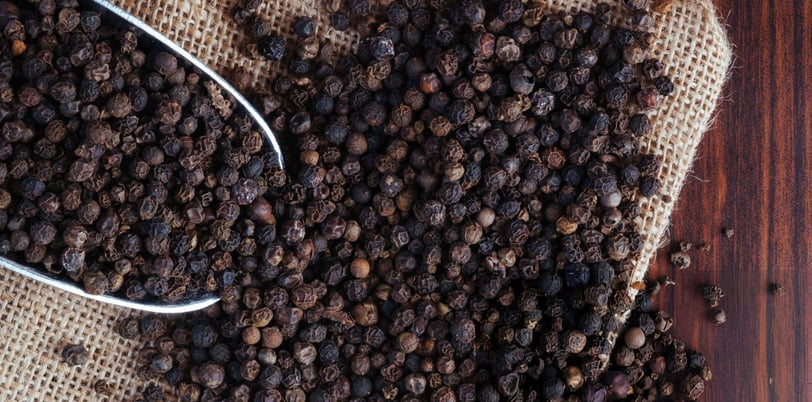The Story Behind Black Pepper: The King of Spices
News Idspices
8/5/20243 min read


Black pepper, often referred to as the “King of Spices,” is one of the most widely used and treasured spices in the world. Its sharp, pungent flavor and bold aroma have made it a kitchen staple in households and restaurants alike. But beyond its culinary use, black pepper has a rich history, numerous health benefits, and a significant role in global trade. Let’s dive deeper into everything you need to know about black pepper.
What is Black Pepper?
Black pepper (Piper nigrum) is a flowering vine native to the tropical regions of South India. The spice itself is derived from the peppercorns, which are the dried fruit of the vine. These small, wrinkled berries are harvested while still green, then fermented and sun-dried until they turn black. The result is the spicy, earthy black peppercorns that add depth to countless dishes around the world.
A Brief History of Black Pepper
Black pepper has been valued for thousands of years, dating back to ancient civilizations. It was once considered so valuable that it was used as currency and was even referred to as "black gold." In the Roman Empire, it was a luxury item traded over long distances from India to Europe. During the Middle Ages, black pepper was a symbol of wealth, often used as a form of tribute or ransom.
The spice played a key role in the spice trade routes that connected Asia, Europe, and Africa, and it even influenced global exploration as European powers sought direct access to spice-producing regions.
Culinary Uses of Black Pepper
Black pepper’s versatility makes it a cornerstone in global cuisine. It can be used as a seasoning, a marinade ingredient, or even as a final touch in finished dishes. Here are a few ways black pepper is commonly used:
Seasoning: Black pepper is often paired with salt as a basic seasoning for meats, vegetables, and soups.
Spice Rubs: Ground black pepper is a key component in spice blends and dry rubs for grilling and roasting.
Finishing Spice: Freshly ground black pepper is added to dishes at the end of cooking to enhance flavor without overpowering the dish.
Sauces and Dressings: It’s a classic ingredient in salad dressings, marinades, and sauces like peppercorn sauce.
The ability to bring out the best in both savory and sweet dishes is what makes black pepper truly indispensable.
Health Benefits of Black Pepper
Black pepper is more than just a flavor enhancer; it’s also packed with beneficial properties:
Rich in Antioxidants: Black pepper is high in piperine, a compound that acts as an antioxidant, helping to neutralize harmful free radicals in the body.
Boosts Nutrient Absorption: Piperine is known to enhance the bioavailability of nutrients like curcumin (found in turmeric), making it more effective.
Improves Digestion: Black pepper stimulates the production of digestive enzymes, aiding in better digestion and reducing bloating.
Supports Weight Loss: Piperine may help in blocking fat cell formation, supporting weight management efforts.
Anti-Inflammatory Properties: The spice has been studied for its potential anti-inflammatory effects, which may benefit joint health and reduce chronic inflammation.
Grades and Varieties of Black Pepper
While black pepper might seem like a straightforward spice, there are different grades and varieties based on where and how it’s grown:
Malabar Black Pepper: Originating from India, this variety is known for its robust flavor and full-bodied aroma.
Tellicherry Peppercorns: Often considered the highest quality, Tellicherry peppercorns are larger and have a more complex, nuanced flavor.
Vietnamese Black Pepper: Vietnam is the largest producer of black pepper, offering high-quality peppercorns that are slightly milder but still aromatic.
Organic vs. Conventional: Organic pepper is grown without synthetic pesticides or fertilizers, catering to consumers who prefer natural farming practices.
Storing and Using Black Pepper
For the best flavor, it’s recommended to buy whole peppercorns and grind them fresh as needed. Store black pepper in an airtight container, away from heat, light, and moisture. Proper storage ensures that the pepper retains its potency and flavor for a longer period.
When cooking, remember that freshly ground black pepper provides a more intense and aromatic experience than pre-ground pepper, which tends to lose its flavor over time.
The Future of Black Pepper in Global Markets
With rising demand for clean-label and organic products, black pepper continues to be a valuable commodity in the spice trade. Its enduring popularity is driven not only by its irreplaceable taste but also by increasing awareness of its health benefits. As consumers continue to explore global cuisines, black pepper remains a fundamental ingredient in kitchens worldwide.
Conclusion
Black pepper’s journey from ancient trade routes to today’s kitchen tables is a testament to its unmatched versatility and timeless appeal. Whether you’re seasoning a simple dish or adding a finishing touch to a gourmet creation, black pepper brings warmth, complexity, and a hint of spice that elevates every bite. As you explore the world of spices, black pepper will always remain a cornerstone of flavor and health in your culinary adventures.
